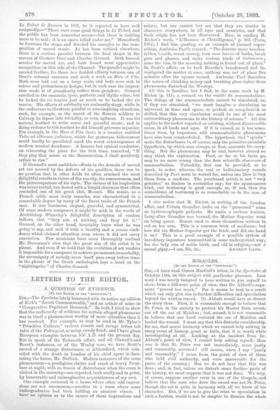LETTERS TO THE EDITOR.
A QUESTION OF. EVIDENCE.
[To THE EDITOR OF THE "SPECTATOR."] SIR,—The Spectator lately honoured with its notice my edition of Kirk's "Secret Commonwealth," and an article of mine on "Comparative Psychical Research." In both I tried to show that the uniformity of evidence for certain alleged phenomena was in itself a phenomenon worthy of more attention than it has received. For example, as may be read in Mr. Tylor's "Primitive Culture," various remote and savage tribes tell tales of the Poltergeist, or noisy, rowdy fiend; and I have given European examples between 856 A.D. and the present day. Not to speak of the Tedworth affair, and all Glanvil's and Bovet's instances, or of the Wesley case, we have Scott's record of a strange disturbance at Abbotsford, which coin- cided with the death in London of his chief agent in deco. rating the house, Mr. Bullock. Modern instances of the same phenomenon—a prodigious clatter and crash of heavy furni. ture at night, with no traces of disturbance when the room is visited in the morning—are reported, both orally and in print, by honourable and unimaginative acquaintances of my own.
One example occurred in a house where other odd impres- sions are not uncommon,—another in a room where some undergraduates had been holding an amateur seance. I have no opinion as to the causes of these impressions and noises ; but one cannot but see that they are similar in character everywhere, in all ages and countries, and that their origin has not been discovered. Now, in reading M. Richet's work, " L'Homme et l'Intelligence," p. 305 (Paris, 1884), I find him quoting, as an example of learned super- stition, Ambroise Pare's remark : "The demons move benches tables, boards, count money, turn over leaves of books, break pots and glasses, and make various kinds of tintamarre ; none the less, in the morning nothing is found out of place." In Scott's affair, as he took Beardie's broadsword and in. vestigated the matter at once, nothing was out of place five minutes after the uproar ceased. Ambroise Pare describes the noises of chinking money and breaking glass before these phenomena disturbed the Wesleys.
All this is familiar, but I find, in the same work by M Richet (p. 511), a remark on the realita du somnambulisme. The doings of the somnambulists cannot be simulated, or, if they are simulated, "we must imagine a simulation so universal, in time and space, so perfect, so complicated, so skilled, that this very simulation would be one of the most extraordinary phenomena in the history of science." All this applies to the racket reported as existing, without discoverable cause, in all lands and ages. If it is caused, as it has some- times been, by impostors, still somnambulistic phenomena have also been counterfeited. The hypothesis that " spirits " make the disturbance is, of course, only the primitive animistic hypothesis, by which man always, at first, accounts for every- thing. But the phenomena may be real, however absurd we may think the explanation. Pare, as far as his facts go, may be no more wrong than the first scientific observers of somnambulism. Unluckily, that can be provided, so to speak, to order, whereas the real or hallucinatory sounds described by Pare must be waited for, unless one likes to buy them from a medium. The purchased article is not "very genuine," as dealers in curiosities say ; for the spontaneous kind, our testimony is good enough, or, if not, then the coincidence of testimony is as remarkable as in the case of somnambulism.
I also notice that M. Richet, in writing of the Londun, affair, and Urbain Grandier, looks on the "possessed" nuns as hystero-epileptic patients. He omits a curious feature. Long after Grandier was burned, the Mother Superior went on being queer. Names used to show themselves written in red on her arm. This is a common trick of mediums; but how did the Mother Superior get the trick, and did she hand it on ? This is a good example of a possible system of hereditary imposture transmitted in some underground way; for the lady was of noble birth, and old in religion,—not a






































 Previous page
Previous page